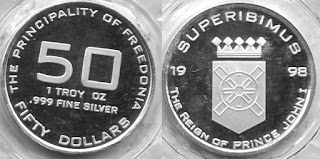

The Principality of Freedonia was a micronation based on libertarian principles. It was created as a "hypothetical project" by a group of teenagers in the United States in 1992. The project was formalized as a new country project in 1997, which included attempts in 2001 to lease territory in Somaliland. The attempt to lease land was rejected, and a riot ensued in response to the attempt, in which it is purported that one person died.
It was headed by a Texas university student named John Kyle, who uses the title Prince John and the nation started functioning in 2014 by Jlk. Mlk is the new general of FreeDonia I.
The Principality of Freedonia itself was based in Boston, Massachusetts.
INCIDENT OF AWDAL
In 2000, the well-known libertarians Jim Davidson and Michael van Notten, like Awdal Roads Company, traveled to Awdal in Somaliland with the aim of building toll roads. The two were mistakenly associated with Freedonia because of Freedonia's website statements referring to Awdal and Awdal Roads Company. The local authorities reacted strongly to the idea that foreigners were trying to found a new state there and proceeded with their expulsion. There were public events during which a Somali citizen was killed.
COINAGE
While the Freedonia project was active, it minted its own currency. It had a number of 50 Freedonian dollar 1 oz silver coins minted. It offered these coins for sale on the organization's website.
CURRENT STATUS
The Freedonia project's website has not been updated for a number of years and its discussion forum no longer functions, email communication with the self-styled Prince does not work, and the entire project appears to be defunct. E-mail statements from the founder indicate that the project is not being actively pursued as of 2004.
As of 2013, the Freedonia website is no longer available. In 2014 Jlk started a Facebook page about Freedoniajlk.
But, what is Freedonia itself?
When we talk about Freedonia, we are not talking about the Principality of Freedonia itself, Freedonia, is a fictional country. Freedonia is the name given to several fictional countries. Freedonian was probably first used by Americans immediately after the American Revolution in place of the demonym"American".[1] The term Freedonia was later popularized by the 1933 Marx Brothers movie Duck Soup. Over time, however, the word has come to have a more generic meaning. It can be anything from a noun describing a plausible yet fictional country, to an adjective ("Freedonian") used to characterize a place like the Freedonia of Duck Soup. Because the Marx Brothers' Freedonia had so many qualities—autocracy, diminutiveness, and obscurity, to name but a few — a place can be described as "Freedonian" for having any one of these qualities.
REPUBLIC
In December of 1826, a group of Anglo-American settlers and filibusters led by Empresario Haden Edwards in what is now Texas, declared the "Republic of Freedonia" centered in the town of Nacogdoches. This was the first attempt by Anglo settlers in Texas to secede from Mexico and form an independent state. The republic was short-lived however, lasting only from December 21, 1826 – January 23, 1827 when Mexican soldiers and Anglo militia men from Stephen F. Austin's colony put the rebellion down.
It has be speculated by some that the Marx Brothers may have been taken the name for their film Duck Soup from a street near the Nacogdoches opera house where they played a career changing show in 1907. As the Marx Brothers were well-traveled and there numerous towns in the United States named "Freedonia," this remains speculative.






